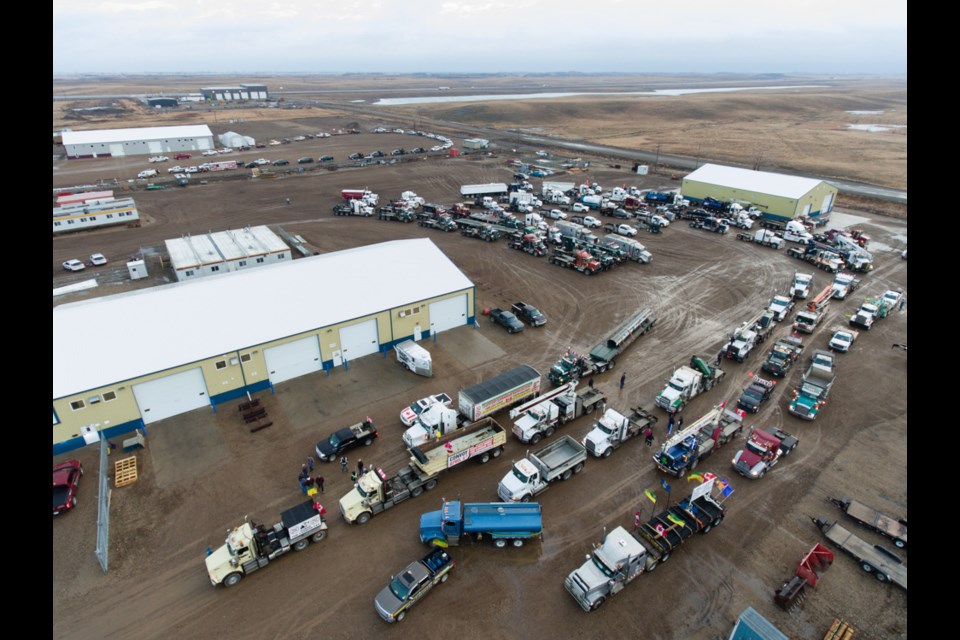Regina, Weyburn, Estevan – At 6 a.m., they started to gather in the KRJ yards in Estevan, one filling with heavy trucks, the second with a line of light vehicles. This was one of the principle gathering points for the convoy leading to the Regina Rally Against the Carbon Tax on April 4.
The folks in Estevan couldn’t claim the earliest start time, however, as a group from Carnduff hit the road at 5:30, pulling into the KRJ yard to join the Estevan group an hour later.
The day before, pressure washers could be seen and heard around Estevan as participants in the convoy washed their units to make them look sparkling. An overnight rain spoiled some of their efforts, but the clouds broke just as the convoy left Estevan at 7 a.m.
The leading edge of the convoy reached the southwest corner of Weyburn at 8 a.m., and here is where things really picked up. Two groups were lined up in Weyburn, one on 22nd Avenue, and a second that left Arcola at 7 a.m. By the time the last truck in that Arcola group got going on Highway 39, it was 8:40. In other words, the convoy was already 40 minutes long, heading into Regina.
There, it was joined on the eastern side of the city by many more units.
The numbers reported that day were in excess of 700 units, mostly semis, taking part.
Once parked on the exhibition grounds, the convoy participants as well as others who weren’t in the convoy gathered in the Queensbury Centre. The room chosen was one of those that can be expanded by opening up partitions to the next room. Those partitions were indeed opened, to the point where attendees were asked to use a second room across the hall, as the primary one was filled to capacity. The attendance was estimated at 1,500, according to staff from the premier’s office who conferred with convention centre personnel.
That 1,500 stood throughout the rally, which had a relatively short program. Dan Cugnet, chairman of Valleyview Petroleum of Weyburn acted as master of ceremonies. The speakers included Souris-Moose Mountain MP Dr. Robert Kitchen, Regina-Wascana Conservative candidate Michael Kram, Estevan farmer and auctioneer Jason LeBlanc, and Premier Scott Moe.
The focus of the event was to fight the federal carbon tax, build pipelines, kill Bill C-69, the Impacts Assessment Act, and Bill C-48, the tanker ban off the northern British Columbia coast.
The applause for LeBlanc was arguably even greater than that for Moe. Four days earlier, his name was brought up in question period by NDP Leader Ryan Meili, who linked LeBlanc to the yellow vest movement, saying, “Far-out-there conspiracy theories, climate change denial, anti-immigrant, anti-Muslim, anti-Semitic sentiment — this is what the yellow vest movement has become, Mr. Speaker. And I do not understand, but I’d like the Premier to explain why he wants to be associated with that group.”
The day after the rally, Meili made something of an apology to LeBlanc on CJME’s John Gormley Live, and said his comments were misinterpreted. LeBlanc had, in fact, been the person at the organizational meetings to insist “Yellow yests prohibited.”
Registrations of participants surged after this kerfuffle.
At the rally, LeBlanc spoke about the impact of the carbon tax on agriculture.
Moe said, “One year ago, it was Saskatchewan alone. Now it is Saskatchewan, and New Brunswick, and Ontario, and Manitoba, and very shortly, maybe Alberta. That will be five provinces presenting 60 per cent of the population of our great nation, the population of Canada, that will oppose this carbon tax. And yesterday, I’m sure many of you saw the news, Manitoba has launched another legal challenge against this carbon tax.
“Here’s what we need, in this province, to be successful. We need market access for our products. Two, we need the ability to get our goods to market, by road, by rail, by pipeline. And three, we need a tax and regulatory structure that allows us to compete with our competitors around the world. We get those three things, and we are successful in this province.
“What they are delivering is Bill C-48, the no more tankers bill. What they are delivering is Bill C-69, the no more pipelines bill. We have pipelines projects across this nation that are stalled. We have pipelines that are not getting built. And we have a federal government that, in addition to that, is delivering to use a federally-imposed carbon tax.
“We look at these policies, and you just try to tell me that this is a federal government that supports working people in this country. You try to convince me that they care about what happens to you, what happens to your family, or what happens to your community, or what happens to your job in the industry you work in.”
For in-depth coverage, see the related stories on this page. There are still more stories and videos to come from this massive event in the coming days, which will be posted on pipelinenews.ca.



